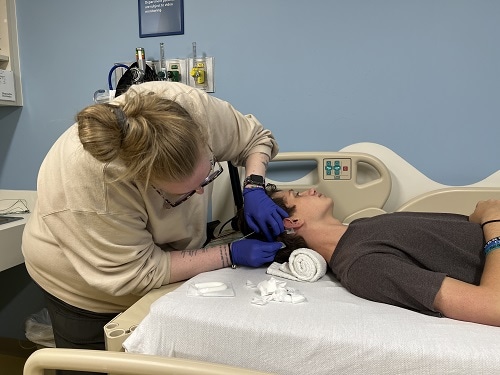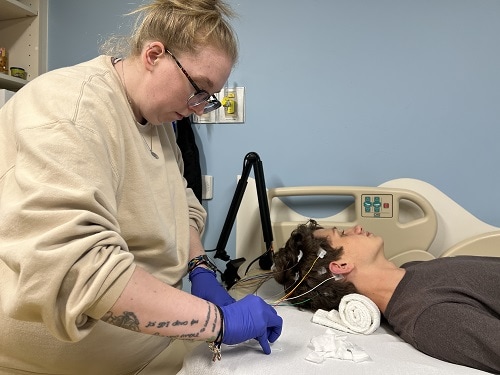Neurology
Extensive Diagnoses & Treatments for Neuro Disorders in Children
The Neurology Lab at East Tennessee Children's Hospital performs tests for patients with seizures, hearing problems and other issues with the brain. These patients can be referred to the neurology lab by their own doctors or while they are patients at our hospital or by our neurologists.
Office Locations
Visiting the Neurology Lab
When it is time to visit the neurology lab for a test, patients and their families will check in at the 1st Floor Admitting/Outpatient Registration area. You will then take the "A" elevators to the 6th floor, where you will find signage to guide them to the Neurology Lab. You may bring anything from home that makes your child comfortable, i.e. a pillow, blanket, or maybe a special stuffed animal. There is a white noise sound machine that can be used during the sleep portion of the test.
 Prep for Neurology Testing
Prep for Neurology Testing

Stroke Care Protocol
Stroke in children is relatively uncommon compared to the adult population. East Tennessee Children’s Hospital has the capability to save the lives of these children because of our pediatric stroke protocol. Read more about our Stroke Protocol.
EEGs
Most of the time, the Neurology Lab will do an electroencephalogram (EEG) to test the electrical impulses of your child's brain. The test takes about an hour and a half. Your child will need to sleep during part of the process. Our staff is well-trained to use natural methods to get your child to fall asleep. Sedation is used in some cases in which the child cannot fall asleep or is very uncooperative. The EEG is not painful. Check with your doctor for a prep sheet and brochure before the day of the test so you can help your child understand what to expect.
Testing Day

Infants under the age of 1 yr., will need to come sleepy and hungry. They will be fed at the lab, and the rest of the test will be with them asleep. For children over 1 yr. of age, they should only sleep from 12 midnight to 4am and then stay awake until their testing time. Sleep deprivation is VERY important to getting an accurate test.
If you have been instructed by your child's doctor, your child may require sedation for the testing, although this is a rare situation. There will be food prep as well - you will need to be in contact with the sedation team for details. The most important thing you can do to prepare your child for an EEG is to assure them that an EEG does not hurt.
A child's EEG results are very different than an adult's. All lab results are sent to pediatric neurologists at the hospital for review, then to your child's doctor. Staff members in the lab are specifically trained to complete these tests with children.
BAER Testing
The Neurology Lab also does brainstem auditory evoked response (BAER) tests to measure your child's hearing. These tests can find out if your child has hearing loss or other problems affecting the brainstem. Children must be relaxed and as still as possible during the test. The entire test takes about an hour and a half.
VER Testing
A visual evoked response (VER) test measures the brain's reaction to what your child sees. Electrodes will be placed on your child's head to track their eyes' reaction to patterns, designs and flashing lights. Each eye will be tested separately. A VER test helps diagnose nerve or brain problems affecting vision.
Seizures
The Neurology Lab completes tests to diagnose seizure disorders and epilepsy. Family history, EEGs, CT scans and MRIs are used by physicians to create a treatment plan for your child. No one knows exactly what causes seizures, but the following things can make a child more likely to have seizures:
- Damage to the brain before, during or immediately following birth
- Physical defects in the brain
- Injury to the head
- Poisoning, usually with lead or alcohol
- Brain damage due to infections
- Brain tumors
- Lack of proper nutrition to the brain
For testing information, call the Neurology Lab at (865) 541-8108.
